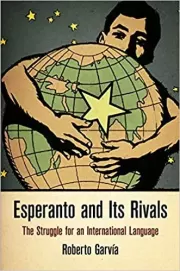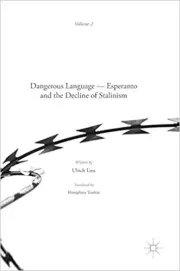Roberto ía - Esperanto and Its Rivals: The Struggle for an International Language
 | Название: | Esperanto and Its Rivals: The Struggle for an International Language |
Автор: | Roberto ía | |
Жанр: | Старинная литература | |
Изадано в серии: | неизвестно | |
Издательство: | неизвестно | |
Год издания: | 2015 | |
ISBN: | неизвестно | |
Отзывы: | Комментировать | |
Рейтинг: | ||
Поделись книгой с друзьями! Помощь сайту: донат на оплату сервера | ||
Краткое содержание книги "Esperanto and Its Rivals: The Struggle for an International Language"
The problems of international communication and linguistic rights are recurring debates in the present-day age of globalization. But the debate truly began over a hundred years ago, when the increasingly interconnected world of the nineteenth century fostered a desire for the development of a global lingua franca. Many individuals and social movements competed to create an artificial language unencumbered by the political rivalries that accompanied English, German, and French. Organizations including the American Philosophical Society, the International Association of Academies, the International Peace Bureau, the Comintern, and the League of Nations intervened in the debate about the possibility of an artificial language, but of the numerous tongues created before World War II, only Esperanto survives today.
Esperanto and Its Rivals sheds light on the factors that led almost all artificial languages to fail and helped English to prevail as the global tongue of the twenty-first century. Exploring the social and political contexts of the three most prominent artificial languages—Volapük, Esperanto, and Ido—Roberto Garvía examines the roles played by social movement leaders and inventors, the strategies different organizations used to lobby for each language, and other early decisions that shaped how those languages spread and evolved. Through the rise and fall of these artificial languages, Esperanto and Its Rivals reveals the intellectual dilemmas and political anxieties that troubled the globalizing world at the turn of the twentieth century.
Читаем онлайн "Esperanto and Its Rivals: The Struggle for an International Language". [Страница - 72]
Esperantistaj, 190 n.4 Tutmonda Esperantista Ligo, 82 Tutmonda Ligo de Esperantistaj Senŝtatanoj, 125
Uber die Pfuscher-Sprache des Pseudo-
Esperanto (Schleyer), 80 Une langue universelle est-ellepossible?
(Leau), 131 Uniono di l'Amiki de la Linguo Interna- ciona, 138
Union of International Associations, 106-7 Universala Esperanto Asocio, 187 n.7 Universal Decimal Classification, 106 Universal Exposition (1900), 79
Universal language, 39, 40, 131-33. See also Artificial languages; Esperanto; Ido; Volapŭk Universal Peace Congress, 107 Universal Postal Union, 22 Unua Libro (Zamenhof), 65-66, 71 Unuiĝo de Esperantistaj Virinoj, 111 Ursprache, 39 Utopia (More), 10
Vegetarianism, 113-14 Volapŭk, 2; Academy for, 46, 80-81; aesthetic dimension of, 52-53; Alfred Kirchhoff's promotion of, 27-28, 37-38, 46; American Philosophical Society report on, 42; anthem for, 176 n.26; antinational aspects of, 36-38; Auguste Kerckhoffs's criticism of, 44-45, 48, 54-55; Auguste Kerckhoffs's promotion of, 30-32; birth of, 21; business and commercial use of, 29, 31-32, 33; changes in, 32-33; complexity vs. simplicity of, 45; critics of, 34-45, 48; demise of, 49-50, 51-56, 155; vs. English, 38; vs. Esperanto, 64, 72, 80, 128; First Congress of, 32-33, 44; in France, 31-32, 34-36; in Germany, 36-38; grammar of, 23, 45, 80-81; international peace and, 28-29; introduc- tory brochure on, 25; journals for, 24, 25, 27, 29, 30, 33, 46, 154; linguists' reactions to, 38-41; literary use of, 28; Ludwig Zamenhof on, 155; Philological Society of London report on, 42-43; popular support for, 23-24, 25-26; purposes of, 26, 27-29, 31-32, 33, 55-56, 103; reform proposals for, 44-50, 51-52; ridicule of, 34-36; Second Congress of, 35, 45-46; textbooks for, 25, 30; Third Congress of, 47-48 Le Volapuk, 46 Volapŭk Academy, 46, 80-81 Volapuk: A Monthly Journal of the World
Language, 29-30 Volapŭkists: clubs of, 24, 25, 46-47;
educational background of, 26; ethnicity of, 26; French, 31-32; gender of, 26; hierarchical organization of, 33, 49-50, 54-55; identity of, 25-27; Nuremberg, 47, 71-72; purge of, 49; World Organization of, 46
Voyage en Icarie (Cabet), 122
Wanderism, 114-15 Wandervogel movement, 115 Wells, H. G., 150 Weltsprache, 41 Wilkins, John, 11
Women's International League for Peace
and Freedom, 111 Words: Esperanto formation of, 66; meaning and, 12-13; Volapŭk formation of, 23, 45, 80-81 World City, 106-7
World Peace League of the White Cross, 116 Yiddish, 63, 90
Zamenhof, Ludwig, 2, 51-52, 156, 157; cosmopolitanism of, 64; on Ido, 135-36; Jewish identity of, 59-60, 62, 78, 84-86, 88-89, 181 n.9; on language, 68-70, 90-91; on nationalism, 63-64; pogrom effects on, 60-61; on Volapŭk, 155. See also Esperanto Zamponi, Ludwig, 29 Ha-Zefirah, 63 Zetter, Carl, 29, 80 Zhirkov, Lev, 155 Zionism, 62-63, 64 Zorell, Franz, 176 n.26
ACKNOWLEDGMENTS
This book began as an article while I was benefiting from the friendly atmo- sphere of the Max-Planck Institute for the Study of Societies (Cologne). When the article kept growing, I was encouraged to transform it into a book. From the Max-Planck, I took the project to the Instituto Juan March and Univer- sidad Carlos III of Madrid, and then to Georgetown University. I am ever grateful to the staffs of these institutions for their help in finding difficult sources, particularly to Paz Fernandez and her library assistants at the Insti- tuto Juan March.
I am also indebted to the students of my seminar on language and na- tionalism at Georgetown University. Their questions and insights into this topic gave me a better view of its many facets. Without the encouragement of Humphry Tonkin, this project would not have come to fruition. I am also very grateful to Ezra W. Zuckerman, Laurel Grassin-Drake, Julia DiBenigno, Sebatian Lavezzolo, and the anonymous reviewers from the University of Pennsylvania Press for their tremendous help in the early phase of this proj- ect. Celia Valiente and Peter Stamatov deserve especial mention here. I owe them much more than a couple cups of coffee. Peter Agree of the University of Pennsylvania Press took an interest in the manuscript when it was only a draft and was always very supportive. I am also much indebted to Jennifer Konieczny, Erica Ginsburg, Susan Thomas, Amanda Ruffner, and Eric Schramm for guiding the production of the book. Pamela Haag made a great contribution by organizing the book for the widest readership possible. I am also thankful to Walter de Gruyter for letting me reproduce Figure 1.
And finally, this book is dedicated to my wife, Genevieve, and our chil- dren, Paloma and Azucena, for their invaluable help and inspiration.
I am a Jew, and all my ideals, their birth, maturity and steadfastness,
I am not looking for praise. I only want people to help me eliminate the mistakes I have made; and the more severe their criticism is, the
the entire history of my constant inner and external conflicts, all
more I will appreciate them I am very aware that the work of a
single person cannot be free from errors, even if this man is the most brilliant, or much more educated than me. Therefore, I have not given to my tongue its final shape. I cannot tell you "Here you have the language: finished and ready; and this is the way I would like it to be and remain."12
--">Книги схожие с «Esperanto and Its Rivals: The Struggle for an International Language» по жанру, серии, автору или названию:
 |
| Fians, Guilherme - Esperanto Revolutionaries and Geeks: Language Politics, Digital Media and the Making of an... Жанр: Старинная литература Год издания: 2021 |
 |
| Ulrich Lins - Esperanto the Dangerous Language Жанр: Старинная литература Год издания: 2017 |


